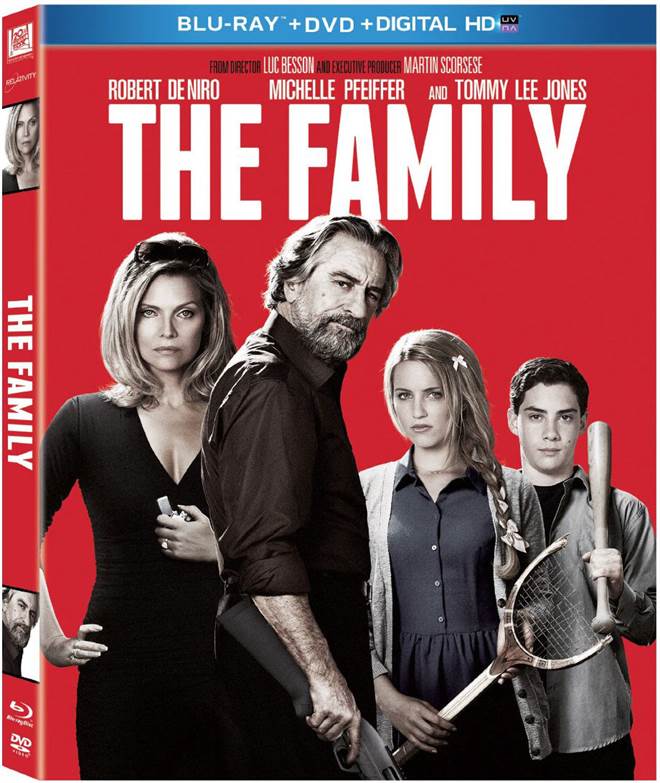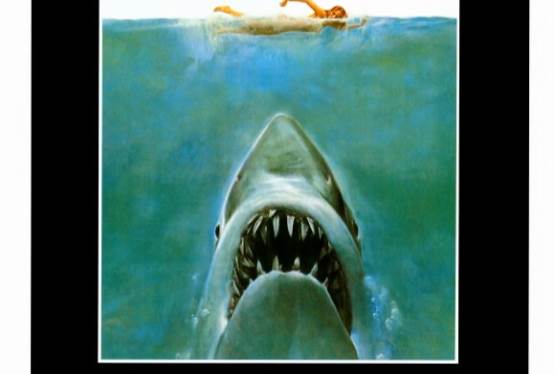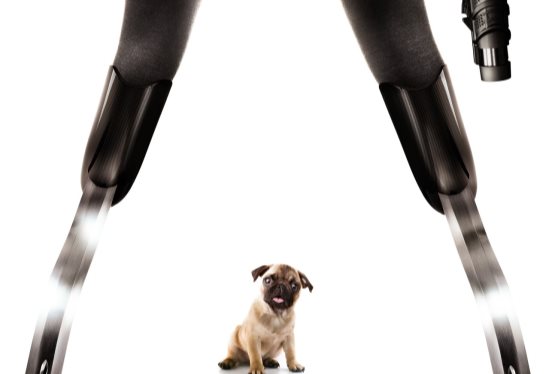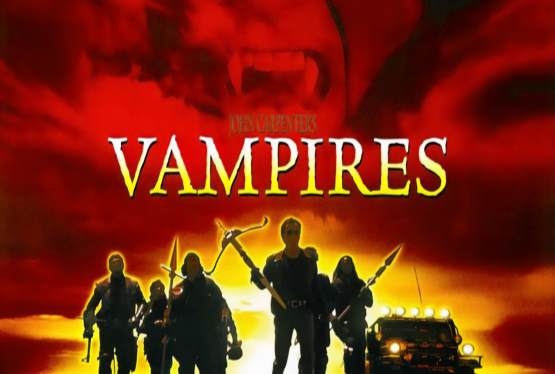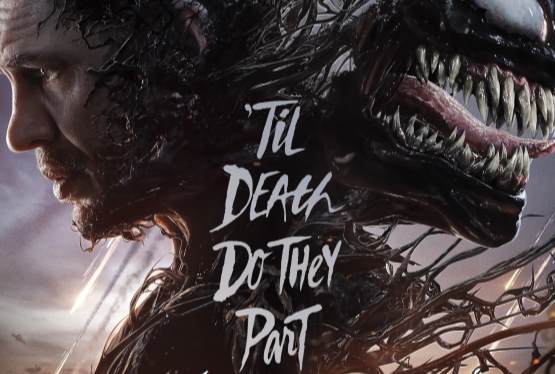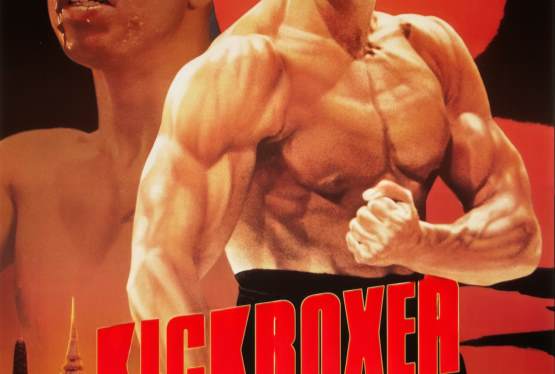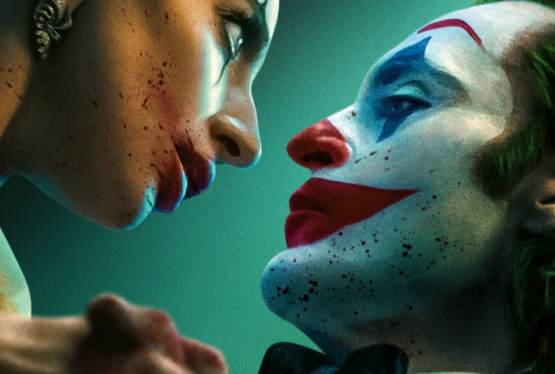Luc Besson's recent film The Family ups the ante of ridiculousness protection by placing an entire family under witness protection and then shipping them off to the picturesque region of Normandy in France. Besson is of course better known for exploiting the visceral action adventure activity of criminals in films like Léon: The Professional and La Femme Nikita rather than the kind of stale dysfunctional comedy he explores in The Family, and Besson himself seems a little unsure of his footing throughout the film, veering rather wildly from quasi-slapstick to more genuinely dramatic fare throughout the film. I've heard that Besson has been accused of emphasizing style over, but there's not even much substance here, either.
The Family starts with a terrifying scene where a sweet Italian family is assassinated by a hit-man, and then quickly segues to a new segment that introduces us to the so-called "Blake" family as they attempt to ferret out their new address in the Normandy village of Cholong-sur-Avre. The Blakes seem like a typically normal, harried family— perhaps on vacation—and there's no explanation of what their story has to do with the opening moments of the film. Only after Fred Blake (Robert De Niro) tells his wife he needs to get some more bags out of their station wagon, and instead disposes of a dead body wrapped in plastic, is the audience let in on the fact that this is no ordinary family. It of course turns out that the Blakes are not indeed the Blakes, but the former Manzonis, part of a large crime family in Manhattan. Fred's real name is Giovanni Manzoni, and he has snitched on his former capo, who is now on the hunt for the family from his jail cell. The family that met their fate in the film's opening sequence had been mistaken for the Manzonis, and the capo wants to make sure no further errors are made.
The rest of the Blake clan consists of wife Maggie (Michelle Pfeiffer), son Warren (John D'Leo) and daughter Belle (Dianna Agron), who rather quickly (and improbably) matriculate into rural French culture, albeit with the occasional outburst of violence when anyone gets in their way. Fred, meanwhile, is having a bit harder time at adjusting, until he finds an old typewriter in the junk left behind in their dilapidated bungalow, and begins typing up his memoirs. Meanwhile, an FBI agent named Stansfield (Tommy Lee Jones), who's assigned to look after the family, has shown up and has begged Fred to lay low in this location, since evidently Stansfield has had to move the family several times previously in order to keep them relatively hidden.
Already there are cracks in the screenplay by Besson and Michael Caleo. The film seems to want to be a whimsical comedy, as evidenced by the scene where Maggie blows up the local village grocery store when she doesn't like the store owner's dismissive attitude toward her request for peanut butter. And the film's underscore, by Evgueni and Sacha Galperine, is full of that Danny Elfman Desperate Housewives approach of brief little phrases punctuated by pizzicato strings that is supposedly informing us all of this is just so funny. But the film keeps veering off into weird tangents that see both Warren and Belle beating the crap out of various people (played for laughs, but delivering none), while the capo's hit-man slowly closes in on the family, threatening their very existence. There's a decided lack of logic, as well. Virtually everyone speaks English in the film, which may have been done out of necessity, but which I'm sure is not the case, especially when you get into the smaller villages like the one depicted. Even Stansfield's insistence that the family not divulge too much about themselves is completely contradicted by his equal insistence that they invite all the neighbors to a big barbecue so that they can make friends.
Meanwhile Warren's nefarious activities at high school and Belle's misguided affair with a college student get both kids out of the house just when the hit-man finally shows up. Fred, in one of the film's worst decisions, attends a film festival with Stansfield where GoodFellas (my favorite mafia film) is being screened and a well-intentioned neighbor of Fred's has invited his commentary (The Family was Executive Produced by Martin Scorsese). This would seem to offer comedic opportunities galore, but it (to purloin a phrase supposedly culled from the world of gangsters) swims with the fishes. The fact that it's intercut with Maggie's increasingly desperate attempts to figure out where everyone is before the hit-men kill them is an even odder directorial choice by Besson.
It's no big surprise, then, that the two most effective sequences in The Family are the bookending segments of the film. The first, the aforementioned hit on the Italian family, is quick, deliberate and shocking. The final several minutes of the film detail the attempted hit on the Blakes and their various reactions, and it shows Besson to be in typically fine form in staging exciting, viscerally alarming violence. Again, he tries to inject a little humor into the mix (after a spectacular explosion, Fred utters his favorite word, the F-bomb), but the joke is actually on the film itself: Besson should have played this one straight from the get go, especially with the cast of the caliber he's assembled for The Family.
The Family is presented on Blu-ray courtesy of 20th Century Fox Home Entertainment with an AVC encoded 1080p transfer in 2.39:1. According to the usually reliable IMDb, the film was shot both traditionally and digitally, and perhaps surprisingly, there are no real stylistic or textural differences that interrupt the visual flow of the film. Besson collaborates here with his longtime cinematographer Thierry Arbogast, who lights the film beautifully, infusing a lot of the scenes with a rich, almost honey-colored, amber glow. The Family's lossless DTS-HD Master Audio 5.1 mix has two things going for it in terms of surround activity, the aforementioned playful music score, and the film's glut of explosions, beatings and, finally, rampant gunfire. These elements provide a wash of great surround activity, which can make some of the film's quieter dialogue scenes seem a bit underwhelming by comparison. The mix here is very well prioritized, and the track exhibits no issues whatsoever to report.
Special Features:
- Making The Family: has some decent interviews with Besson and De Niro, but is a pretty rote EPK-fest.
- The Many Meanings of Fu*%!: is a compendium of the film's frequent use of the F-bomb.
- Theatrical Trailer
The Family simply doesn't know what kind of film it wants to be. Besson had two choices here, either playing everything as an outright farce, or playing it straight as a thriller. The weird mash up on display satisfies neither genre and instead will probably leave most audience members shaking their heads that such a fine cast (and, frankly, director) wasted their efforts on something this lackluster.
Grade: C

